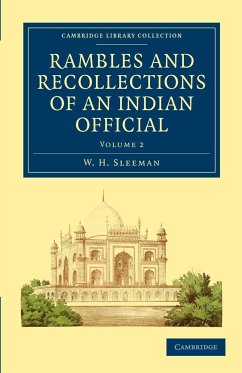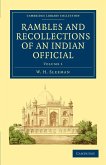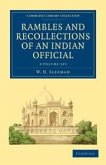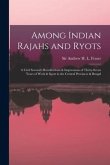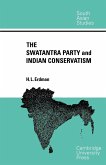W. H. Sleeman
Rambles and Recollections of an Indian Official - Volume 2
W. H. Sleeman
Rambles and Recollections of an Indian Official - Volume 2
- Broschiertes Buch
- Merkliste
- Auf die Merkliste
- Bewerten Bewerten
- Teilen
- Produkt teilen
- Produkterinnerung
- Produkterinnerung
A wide-ranging two-volume portrait of India written by a British colonial official who lived there for more than thirty years.
Andere Kunden interessierten sich auch für
![Rambles and Recollections of an Indian Official - Volume 1 Rambles and Recollections of an Indian Official - Volume 1]() W. H. SleemanRambles and Recollections of an Indian Official - Volume 155,99 €
W. H. SleemanRambles and Recollections of an Indian Official - Volume 155,99 €![Rambles and Recollections of an Indian Official; Volume 1 Rambles and Recollections of an Indian Official; Volume 1]() William SleemanRambles and Recollections of an Indian Official; Volume 127,99 €
William SleemanRambles and Recollections of an Indian Official; Volume 127,99 €![Rambles and Recollections of an Indian Official 2 Volume Set Rambles and Recollections of an Indian Official 2 Volume Set]() W H SleemanRambles and Recollections of an Indian Official 2 Volume Set128,99 €
W H SleemanRambles and Recollections of an Indian Official 2 Volume Set128,99 €![Among Indian Rajahs and Ryots: a Civil Servant's Recollections & Impressions of Thirty-seven Years of Work & Sport in the Central Provinces & Bengal Among Indian Rajahs and Ryots: a Civil Servant's Recollections & Impressions of Thirty-seven Years of Work & Sport in the Central Provinces & Bengal]() Among Indian Rajahs and Ryots: a Civil Servant's Recollections & Impressions of Thirty-seven Years of Work & Sport in the Central Provinces & Bengal29,99 €
Among Indian Rajahs and Ryots: a Civil Servant's Recollections & Impressions of Thirty-seven Years of Work & Sport in the Central Provinces & Bengal29,99 €![The Swatantra Party and Indian Conservatism The Swatantra Party and Indian Conservatism]() Howard L. ErdmanThe Swatantra Party and Indian Conservatism55,99 €
Howard L. ErdmanThe Swatantra Party and Indian Conservatism55,99 €![The History of India, as Told by Its Own Historians - Volume 3 The History of India, as Told by Its Own Historians - Volume 3]() Henry Miers ElliotThe History of India, as Told by Its Own Historians - Volume 366,99 €
Henry Miers ElliotThe History of India, as Told by Its Own Historians - Volume 366,99 €![The History of India - Volume 1 The History of India - Volume 1]() Mountstuart ElphinstoneThe History of India - Volume 166,99 €
Mountstuart ElphinstoneThe History of India - Volume 166,99 €-
-
-
A wide-ranging two-volume portrait of India written by a British colonial official who lived there for more than thirty years.
Hinweis: Dieser Artikel kann nur an eine deutsche Lieferadresse ausgeliefert werden.
Hinweis: Dieser Artikel kann nur an eine deutsche Lieferadresse ausgeliefert werden.
Produktdetails
- Produktdetails
- Verlag: Cambridge University Press
- Seitenzahl: 504
- Erscheinungstermin: 11. Februar 2011
- Englisch
- Abmessung: 216mm x 140mm x 29mm
- Gewicht: 704g
- ISBN-13: 9781108228954
- ISBN-10: 110822895X
- Artikelnr.: 33278421
- Herstellerkennzeichnung
- Libri GmbH
- Europaallee 1
- 36244 Bad Hersfeld
- gpsr@libri.de
- Verlag: Cambridge University Press
- Seitenzahl: 504
- Erscheinungstermin: 11. Februar 2011
- Englisch
- Abmessung: 216mm x 140mm x 29mm
- Gewicht: 704g
- ISBN-13: 9781108228954
- ISBN-10: 110822895X
- Artikelnr.: 33278421
- Herstellerkennzeichnung
- Libri GmbH
- Europaallee 1
- 36244 Bad Hersfeld
- gpsr@libri.de
1. Pindaree system. Character of the Mahratta administration. Causes of their dislike to the paramount power
2. Dholepore, capital of the Jat chiefs of Gohud. Consequence of obstacles to the prosecution of robbers
3. Influence of electricity on vegetation. Agra and its buildings
4. Noor Jehan, the aunt of the Empress Noor Bahul, over whose remains the Taj is built
5. Father Gregory's notion of the impediments to conversion in India. Inability of Europeans to speak Eastern languages
6. Futtehpore Secree. The Emperor Akbar's pilgrimage. Birth of Jehangeer
7. Bhurtpore. Deeg. Want of employment for the military and the educated classes under the Company's rule
8. Goverdhun, the scene of Krishna's dalliance with the milkmaids
9. Veracity
10. Declining fertility of the soil. Popular notion of the cause
11. Concentration of capital, and its effects
12. Transit duties in India. Mode of collecting them
13. Peasantry of India attached to no existing government. Want of trees in Upper India. Cause and consequence. Wells and groves
14. Public spirit of the Hindoos. Tree cultivation, and suggestion for extending it
15. Cities and towns, formed by public establishments, disappear as Sovereigns and Governors change their abodes
16. Murder of Mr. Fraser, and execution of the Nowab Shumshoodeen
17. Marriage of a Jât chief
18. Collegiate endowment of Mahomedan tombs and mosques
19. The old city of Delhi
20. New Delhi, or Shah Jehanabad
21. Indian police. Its defects, and their cause and remedy
22. Rent-free tenures. Right of Government to resume such grants
23. The station of Meerut. Atalees who dance and sing gratis for the benefit of the poor
24. Subdivision of lands. Want of gradations of rank. Taxes
25. Meerut. Anglo-Indian society
26. Pilgrims in India
27. The Begum Sumroo
28. On the spirit of military discipline in the native army of India
29. Invalid establishment.
2. Dholepore, capital of the Jat chiefs of Gohud. Consequence of obstacles to the prosecution of robbers
3. Influence of electricity on vegetation. Agra and its buildings
4. Noor Jehan, the aunt of the Empress Noor Bahul, over whose remains the Taj is built
5. Father Gregory's notion of the impediments to conversion in India. Inability of Europeans to speak Eastern languages
6. Futtehpore Secree. The Emperor Akbar's pilgrimage. Birth of Jehangeer
7. Bhurtpore. Deeg. Want of employment for the military and the educated classes under the Company's rule
8. Goverdhun, the scene of Krishna's dalliance with the milkmaids
9. Veracity
10. Declining fertility of the soil. Popular notion of the cause
11. Concentration of capital, and its effects
12. Transit duties in India. Mode of collecting them
13. Peasantry of India attached to no existing government. Want of trees in Upper India. Cause and consequence. Wells and groves
14. Public spirit of the Hindoos. Tree cultivation, and suggestion for extending it
15. Cities and towns, formed by public establishments, disappear as Sovereigns and Governors change their abodes
16. Murder of Mr. Fraser, and execution of the Nowab Shumshoodeen
17. Marriage of a Jât chief
18. Collegiate endowment of Mahomedan tombs and mosques
19. The old city of Delhi
20. New Delhi, or Shah Jehanabad
21. Indian police. Its defects, and their cause and remedy
22. Rent-free tenures. Right of Government to resume such grants
23. The station of Meerut. Atalees who dance and sing gratis for the benefit of the poor
24. Subdivision of lands. Want of gradations of rank. Taxes
25. Meerut. Anglo-Indian society
26. Pilgrims in India
27. The Begum Sumroo
28. On the spirit of military discipline in the native army of India
29. Invalid establishment.
1. Pindaree system. Character of the Mahratta administration. Causes of their dislike to the paramount power
2. Dholepore, capital of the Jat chiefs of Gohud. Consequence of obstacles to the prosecution of robbers
3. Influence of electricity on vegetation. Agra and its buildings
4. Noor Jehan, the aunt of the Empress Noor Bahul, over whose remains the Taj is built
5. Father Gregory's notion of the impediments to conversion in India. Inability of Europeans to speak Eastern languages
6. Futtehpore Secree. The Emperor Akbar's pilgrimage. Birth of Jehangeer
7. Bhurtpore. Deeg. Want of employment for the military and the educated classes under the Company's rule
8. Goverdhun, the scene of Krishna's dalliance with the milkmaids
9. Veracity
10. Declining fertility of the soil. Popular notion of the cause
11. Concentration of capital, and its effects
12. Transit duties in India. Mode of collecting them
13. Peasantry of India attached to no existing government. Want of trees in Upper India. Cause and consequence. Wells and groves
14. Public spirit of the Hindoos. Tree cultivation, and suggestion for extending it
15. Cities and towns, formed by public establishments, disappear as Sovereigns and Governors change their abodes
16. Murder of Mr. Fraser, and execution of the Nowab Shumshoodeen
17. Marriage of a Jât chief
18. Collegiate endowment of Mahomedan tombs and mosques
19. The old city of Delhi
20. New Delhi, or Shah Jehanabad
21. Indian police. Its defects, and their cause and remedy
22. Rent-free tenures. Right of Government to resume such grants
23. The station of Meerut. Atalees who dance and sing gratis for the benefit of the poor
24. Subdivision of lands. Want of gradations of rank. Taxes
25. Meerut. Anglo-Indian society
26. Pilgrims in India
27. The Begum Sumroo
28. On the spirit of military discipline in the native army of India
29. Invalid establishment.
2. Dholepore, capital of the Jat chiefs of Gohud. Consequence of obstacles to the prosecution of robbers
3. Influence of electricity on vegetation. Agra and its buildings
4. Noor Jehan, the aunt of the Empress Noor Bahul, over whose remains the Taj is built
5. Father Gregory's notion of the impediments to conversion in India. Inability of Europeans to speak Eastern languages
6. Futtehpore Secree. The Emperor Akbar's pilgrimage. Birth of Jehangeer
7. Bhurtpore. Deeg. Want of employment for the military and the educated classes under the Company's rule
8. Goverdhun, the scene of Krishna's dalliance with the milkmaids
9. Veracity
10. Declining fertility of the soil. Popular notion of the cause
11. Concentration of capital, and its effects
12. Transit duties in India. Mode of collecting them
13. Peasantry of India attached to no existing government. Want of trees in Upper India. Cause and consequence. Wells and groves
14. Public spirit of the Hindoos. Tree cultivation, and suggestion for extending it
15. Cities and towns, formed by public establishments, disappear as Sovereigns and Governors change their abodes
16. Murder of Mr. Fraser, and execution of the Nowab Shumshoodeen
17. Marriage of a Jât chief
18. Collegiate endowment of Mahomedan tombs and mosques
19. The old city of Delhi
20. New Delhi, or Shah Jehanabad
21. Indian police. Its defects, and their cause and remedy
22. Rent-free tenures. Right of Government to resume such grants
23. The station of Meerut. Atalees who dance and sing gratis for the benefit of the poor
24. Subdivision of lands. Want of gradations of rank. Taxes
25. Meerut. Anglo-Indian society
26. Pilgrims in India
27. The Begum Sumroo
28. On the spirit of military discipline in the native army of India
29. Invalid establishment.

